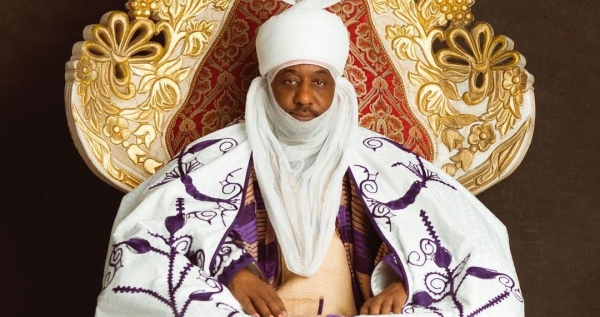The Emir of Kano, Muhammadu Sanusi II has shared his insights on Nigeria’s political landscape, casting doubt on the feasibility of regionalism as a solution to the country’s challenges.
Sanusi, in an exclusive interview published by Vanguard, questioned the necessity of a bicameral legislature and the rationale behind appointing ministers from every state, even when not required.
Sanusi began by questioning the necessity of maintaining a bicameral legislature and the practice of appointing a minister from every state, regardless of need. He argued that such practices contribute to bureaucratic inefficiencies and do not necessarily serve the best interests of the nation.
Reflecting on Nigeria’s historical and political context, Sanusi criticized federal government interference in state matters, particularly regarding traditional and chieftaincy affairs. He stressed the importance of upholding constitutional principles and maintaining a clear separation of powers to ensure accountable governance.
The Emir, drawing from his experiences, highlighted the imperfect yet preferable nature of democracy compared to past authoritarian regimes. He emphasized the need for political leaders to honor constitutional agreements and foster a unified approach to governance, rather than exploiting regional or ethnic identities for personal or political gain.
Addressing the concept of regionalism, Sanusi questioned its practicality in a country marked by diverse ethnicities and historical divisions. He pointed out ongoing conflicts and asserted that further subdividing Nigeria into regions might exacerbate rather than resolve existing tensions. Instead, he called for a more cohesive national identity and governance structure that promotes unity and accountability.
His words, “I think there are several things we can do to address those structures because at the end of the day, if you allow the state governors to run, the thing with devolution is we have 36 states, if only half of the governors are good, at least half of Nigeria has a good government. There is too much power at the centre, too much of the resources. The centre does not do primary education or primary healthcare, and that is where the vast majority of Nigerians are. Shouldn’t those resources come to the state? Instead of everybody going to Abuja, what is happening in Abuja? There are several issues that we need to look at. And also simple constitutionalism and federalism, just even the respect of separation of separation of power. If you take the example of what is happening in Kano today, chieftaincy matter is 100 per cent a state matter.
“…We had a parliamentary system in the First Republic. What happened? At the end of the day, it is the humans that operate the system. People talk about regions. Initially, the regions we had in this country were North, East, and West, and then it became NorthEast and MidWest. Where did the creation called six geo-political zones come from historically? We can keep dividing and subdividing this country and thinking of ourselves, but are we really honest? Are these regions?
“If you go to the Niger Delta, since when did the Itsekiri stop fighting wars against the Ijaw? Since when did we become homogeneous?
“It was the Sokoto Jihad that brought us together. From the Sokoto caliphate, we became Northerners, from Northerners, we became Nigerians.When I was in King’s College, I grew up under Yakubu Gowon in a country where Nigerians were thinking like Nigerians. What happened? Political leadership is the one that exploits regional and ethnic identities as part of the struggle for political office.
“When they get there, they all sit together. If you look at the president’s cabinet, what do you have? You have everybody from every state. You have Christians, you have Muslims, you have Northerners and Southerners. Why are they not fighting one another in there? The elites are irresponsible.
“Don’t think that pandering to these elites by saying the solution is going to a regional system of government. How do we go regional? In Yorubaland, there are Ijebu, Ekiti, Ijesha, Owo, and Egba since when did they become one? Right there between Ife and Modakeke, they were killing each other. It is not about that. It is not a solution. How many parts are you going to slice this country to get a homogenous country? How? With all the intermarriages and education, I am not sure that is a solution, and I think people have this dream that can only be sold by blocking out history.
“We had a regional system in the First Republic. How did it end? We had a parliamentary system in the First Republic. How did it end? I am not talking about the coup; I am talking about the crisis that led to the coup. Before Nzeogu, forget Ironsi. How was the system before they came? Is there any documentary evidence that that system was fundamentally better than what we have?
“We can’t shift responsibilities away from human beings, the people who are responsible for operating the system. If you go to the Senate and the House of Representatives, and you are there for 16 years and you have never passed a bill, you don’t even know that your job is to be a lawmaker.”


